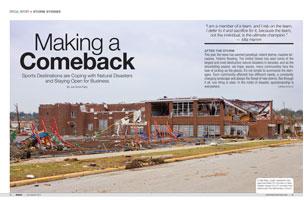
"I am a member of a team, and I rely on the team, I defer to it and sacrifice for it, because the team, not the individual, is the ultimate champion." - Mia Hamm
After the Storm
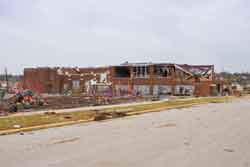 |
| In late May, Joplin residents had approximately 25 minutes to take shelter ahead of a F5 tornado that destroyed this elementary school. |
This year, the news has seemed perpetual: violent storms, massive tornadoes, historic flooding. The United States has seen some of the largest and most destructive natural disasters in decades, and as the devastating season, we hope, wanes, many communities face the task of picking up the pieces.
It's not simple to summarize the damages. Each community affected has different needs, a constantly changing landscape and always the threat of new storms. But through it all, one thing is clear: in the midst of disaster, sportsmanship is everywhere.
The Southeast
In April, storms raged across areas of Alabama, Georgia, Mississippi, Kentucky, Virginia, Louisiana and Tennessee. Of the many towns affected, Tuscaloosa, home of the University of Alabama and the Tuscaloosa Tourism and Sports Commission, was one of the hardest hit. Fortunately, Tuscaloosa had an advantage: a seriously prepared city government.
"Tuscaloosa's mayor and city leadership, several years ago, attended a community management, disaster preparedness course," says Don Staley, executive director of sports, Tuscaloosa Tourism and Sports Commission.
Staley was out the day after the tornado, setting up a mobile relief center with his wife at her now-destroyed workplace. Robert Ratliff, executive director of tourism, Tuscaloosa Tourism and Sports Commission, used his social networking expertise to establish, in partnership with Tuscaloosa's media outlets, an information site, www.recovertuscaloosa.com.
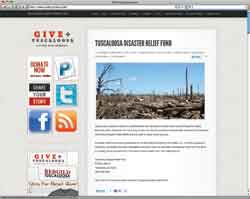 The West Alabama Chamber of Commerce Foundation, in cooperation with the city of Tuscaloosa, established Tuscaloosa Disaster Relief Fund (www.givetuscaloosa.com), and Nick Saban, University of Alabama head football coach, led by example, as all great coaches do. He and his wife Terry continue to raise money to help children and their families recover from the disaster through their foundation, Nick's Kids (www.nickskidsfund.com).
The West Alabama Chamber of Commerce Foundation, in cooperation with the city of Tuscaloosa, established Tuscaloosa Disaster Relief Fund (www.givetuscaloosa.com), and Nick Saban, University of Alabama head football coach, led by example, as all great coaches do. He and his wife Terry continue to raise money to help children and their families recover from the disaster through their foundation, Nick's Kids (www.nickskidsfund.com).
Staley and his team soldiered on, despite the challenges, hosting a three-on-three basketball tournament just weeks after the storm. But they didn't do it alone.
"Mike Guswiler at the West Michigan Sports Commission called me up and said, ‘What can I do to help?' I told him we had this tournament coming up, and he went to work," explains Staley. With Guswiler leading the charge, sports commissions from all over the country sent donations to Tuscaloosa, making it possible for the basketball tournament, which raised money for givetuscaloosa.com and Nick's Kids, not just to happen, but also to be a huge success.
Guntersville, Alabama, suffered extensive damage from the same storm, but with a little flexibility and creativity, hasn't missed a step.
"The sport that was affected most was our fishing," explains Lisa Socha, president, Marshall County Convention and Visitors Bureau. "Lake Guntersville State Park, one of the major locations for our fishing events, was pretty much destroyed."
The primary weigh-in site for the area's many fishing tournaments, Lake Guntersville Park was closed for several weeks after the tornado, creating a challenge for several fishing tournaments. Socha and her team "found other locations for weigh-ins and to just kept on fishing."
Marshall County, already known as a bass and crappie fishing destination, is also home to a variety of other tournaments, including softball, baseball and golf. Socha promises those facilities will be ready when the seasons come.
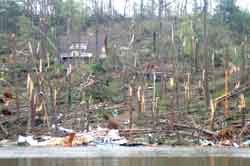 |
| The National Weather Service reported multiple tornado touchdowns in Guntersville, Alabama. |
To the north, Hunstville also got part of the massive storm system, but emerged relatively well, says Don Dukemineer, convention sales manager for the Huntsville/Madison County Convention and Visitors Bureau.
"We were without power Wednesday evening and it didn't come on again until Sunday for a lot of folks," says Dukemineer. "It forced the cancellation of quite a few events, mostly conferences and meetings, but most are rescheduling for later in the year."
Because Huntsville sustained less damage than other areas, the city began helping neighbors who faced greater need. The Huntsville/Madison County Visitors Center has become a drop-off location for donations as well as a central information location for residents who need to register for FEMA assistance and other kinds of aid.
Decatur, Alabama, used its sports events to help others. Over Father's Day weekend, the Bassmaster Elite Series wrapped up its season in Decatur, and the Decatur-Morgan County Convention and Visitors Bureau used the event as a community-builder. The CVB sponsored a Family Jam Music Fest, two days of concerts, children's activities and games, fireworks and a focus on donating to tornado relief for northern Alabama.
Like Huntsville, Decatur was without power following the storm, and while initially, two tournaments had to be moved or cancelled, Decatur found a way to keep playing.
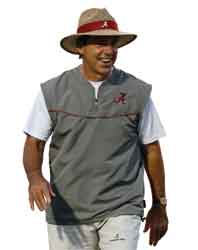 "We had the Alabama High School Athletic Association tennis tournament, and the person in charge decided to cancel the first day, and have the kids hang out in the hotels to be safe," says Tami Reist, president/CEO, Decatur Morgan County Convention & Visitors Bureau. "But she called the next day and said, ‘We're going to play,' and we did. We were even still able to feed them by doing a fish fry, which we figured out how to do without power."
"We had the Alabama High School Athletic Association tennis tournament, and the person in charge decided to cancel the first day, and have the kids hang out in the hotels to be safe," says Tami Reist, president/CEO, Decatur Morgan County Convention & Visitors Bureau. "But she called the next day and said, ‘We're going to play,' and we did. We were even still able to feed them by doing a fish fry, which we figured out how to do without power."
Oklahoma
Oklahoma, well-acquainted with tornadoes, is home to the National Weather Center at the University of Oklahoma in Norman. While warnings can't prevent tornado damage, they can save lives.
"Some homes and facilities were damaged, but overall things have been pretty good," says Jana Ivy, director of marketing, Frontier Country Marketing Association. "Very few lives were lost due to the amazing coverage we have with our warning system. Our organization has a tourism/attractions membership base, and we've been in contact with all of them, asking how we can help."
Sue Hollenbeck, assistant director of sports business development, Oklahoma City Convention and Visitors Bureau, tells a similar story.
"The city itself wasn't really affected; outlying areas saw the most damage. We're trying to help in every way possible, and it's just an ongoing process," says Hollenbeck. "But we're on-schedule for all of our events, and the storms so far haven't affected what we're doing. But for those who are affected, it really is a long and difficult process."
Missouri
"We're taking it day by day," says Patrick Tuttle, director, Joplin Convention and Visitors Bureau. "But so many people have stepped up. It's a pay-it-forward kind of atmosphere, and those are the things that will make healing a lot quicker."
In late May, Joplin residents had approximately 25 minutes to take shelter ahead of the F5 tornado. Following that storm, more than 7,000 households registered with FEMA for assistance, and as many as 1,600 families no longer have any home at all.
Just 30 minutes away, in Pittsburg, Kansas, the spirit of sportsmanship is helping Joplin residents recover. On the day of the tornado, one of the teams had already arrived for the 2011 SAE Society of Automotive Engineers Baja. More than 900 attendees were scheduled to stay in Joplin hotel rooms for the event, and though Joplin's hotels weren't damaged, they were desperately needed to house rescue and aid workers.
"Joplin got hit on Sunday, and immediately, that night, we're springing into action, whatever we can do to help," says Craig Hull, director, Crawford County Convention and Visitors Bureau. "But we're also figuring out what to do with our teams, and there weren't a lot of options."
A plan emerged to house the participants in Pittsburg State University dorms. There was some concern that the teams might be unhappy, but that never panned out.
"Several of the teams coming to the event actually contacted us in advance," says Hull. "They wanted to know what they could bring with them that people might need."
That spirit continued throughout the event. There were no complaints, only donations. In addition to the donations collected at the event's registration, the Crawford County CVB donated leftover food, bottled water and product from the event.
"These teams, they all had disasters in their own countries, and they know what it's like," says Hull. "They really just wanted to do something, and it all adds up. It was really pretty amazing."

